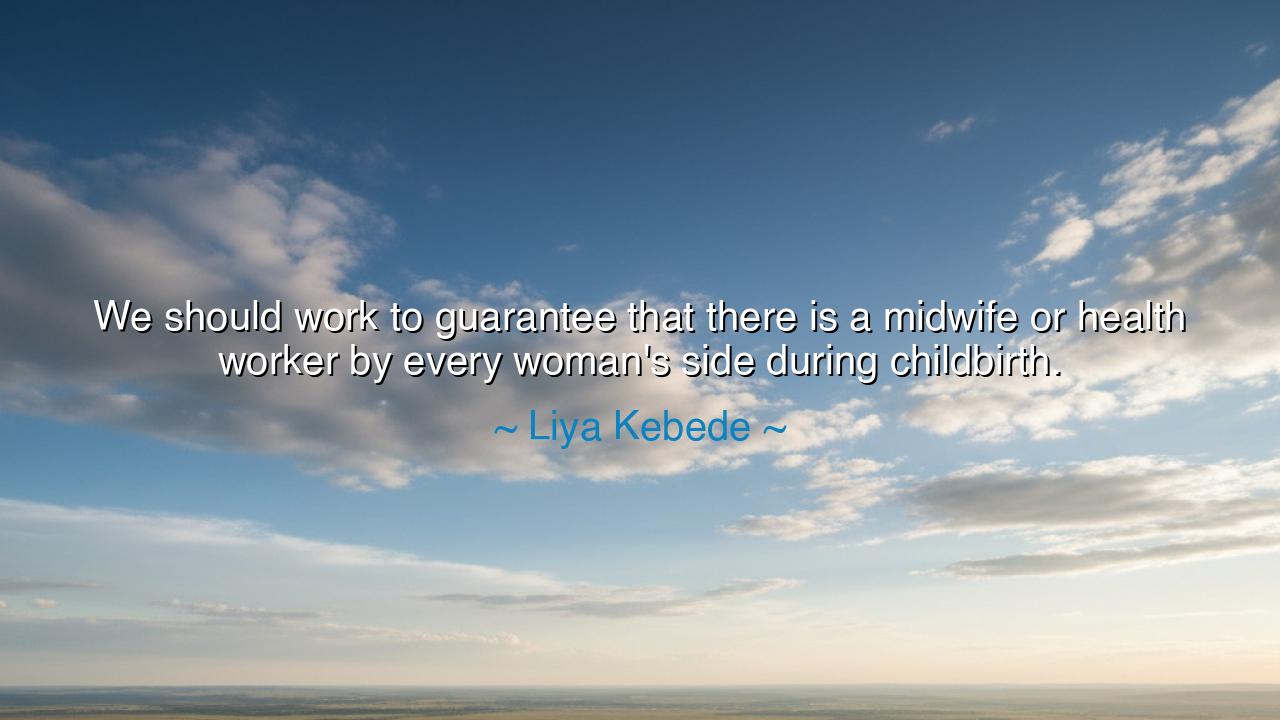
We should work to guarantee that there is a midwife or health
We should work to guarantee that there is a midwife or health worker by every woman's side during childbirth.






In the tender yet commanding words of Liya Kebede, we hear the echo of an eternal truth: “We should work to guarantee that there is a midwife or health worker by every woman’s side during childbirth.” This is not merely a plea for policy or charity — it is a declaration of reverence for life itself. It speaks to the sacred bond between mother and child, the primal threshold where humanity is born anew. Kebede, a global advocate for maternal health, gives voice to what the ancients already knew: that childbirth is both miracle and peril, and that to stand beside a woman in that moment is to stand beside creation itself.
In the days of old, before hospitals and machines, there were midwives, those wise women who carried the ancient knowledge of birth. They were not doctors in name, but healers in spirit — guardians of generations. In the dim light of huts, under the glow of torches, they guided life from darkness to dawn. Every civilization, from the Nile Valley to the hills of Greece and the plains of Africa, honored them. To ensure that no woman faced birth alone was considered a duty of the community, for to abandon the birthing mother was to betray the future. Liya Kebede’s words are thus a return to this sacred wisdom — a reminder that progress is not only measured in technology, but in care and presence.
The origin of her statement lies in her own life and mission. As an Ethiopian-born model and philanthropist, Kebede witnessed firsthand the tragic reality that in many parts of the world, women still die giving life — not from fate, but from neglect. Thousands perish each year for lack of skilled hands to assist them. Her words are both an awakening and a lament: that in an age of abundance, mothers still bleed alone, and infants still draw their first breath without safety. Her call is not for pity, but for action — to build a world where every woman, no matter her wealth or nation, is surrounded by care when she stands at the gate of motherhood.
Consider the story of Ignaz Semmelweis, a 19th-century physician who discovered that simple handwashing could save countless mothers from the deadly fever that haunted hospitals. His insight was ignored for years, his warnings mocked, and many continued to die. Yet history vindicated him, and his truth became one of medicine’s cornerstones: that the smallest acts of care can protect the greatest miracle of life. Liya Kebede’s words walk in that same lineage — they remind us that salvation often begins not in grand gestures, but in compassion, in the simple yet profound act of ensuring someone is there when life begins.
In her words, there is also a deeper spiritual lesson. Childbirth is not only a biological event; it is the passing of one life through another. It is the mother’s moment of both vulnerability and transcendence — when her pain becomes the vessel of creation. To have a midwife or health worker by her side is to acknowledge that her struggle is holy, her endurance divine. It is to say to every mother: You are not alone in this labor; we honor your courage, and we will stand with you. In this act of accompaniment, humanity itself reaffirms its compassion and continuity.
The ancients taught that how a people treat their mothers reveals their soul. A nation that guards its mothers guards its future; a society that lets them suffer unattended betrays its destiny. Kebede’s quote, therefore, is not only a plea for better health care — it is a mirror held up to civilization. It asks: what kind of world are we building, if life’s first moment is marked by danger instead of dignity? To protect mothers is to protect humanity itself, for every life that begins in safety strengthens the foundation of the world.
Let this truth, then, be passed on: no woman should give life in solitude or fear. To every leader, healer, and citizen, Liya Kebede’s words are a summons — to train midwives, to build clinics, to bring hope where silence reigns. But beyond policy, it is a call to the heart: to recognize the holiness of birth, to stand beside those who bring forth life, and to remember that compassion, not progress alone, sustains the world.
And so, my listener, take this wisdom into your soul: where there is a woman giving birth, there is the pulse of creation itself. Let her not stand alone. Let her be surrounded by hands that guide, voices that comfort, and hearts that care. For when we protect the mother, we protect all that is sacred in humanity. As Liya Kebede reminds us, to place a midwife by every woman’s side is to place hope by the cradle of the world.






AAdministratorAdministrator
Welcome, honored guests. Please leave a comment, we will respond soon